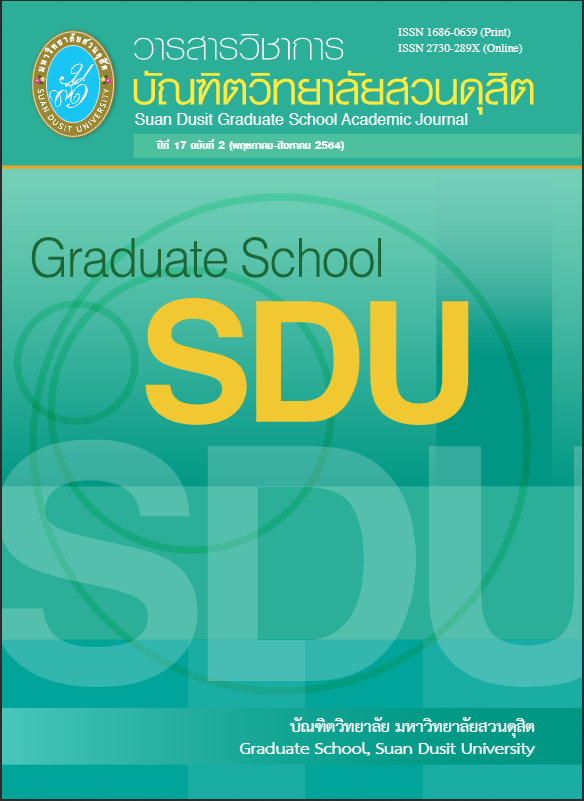The Guidelines of Tourism Supply Chain Management in Phuket
Keywords:
Tourism, Supply Chain, PhuketAbstract
The objectives of this research were 1) to study the opinion of Thai tourists 2) to compare the level of tourism supply chain management in Phuket according to individual characteristics 3) to suggest the guidelines of tourism supply chain management in Phuket. The explanatory mixed-method research was employed in this study. 384 samples were recruited by the accidental sampling. The questionnaire with the content validity of 0.8 was used as the tool for data collection of which the questions were selected with an α value of 0.75 or higher. The statistics for data analysis included percentage, frequency, standard deviation, means, t-test, One-way ANOVA. The in-depth interview was conducted with 10 key informants. The research results revealed that (1) Before traveling, the opinion towards the information flow was at the high level (3.57). During traveling, physical flow and tourist attraction were at the high level (3.86). The facilities (3.45) and safety (3.37) were found at the moderate level. The information of information flow was at the high level (3.63). The time was found at the moderate level (3.28) while the payment of financial flow was at the high level (3.54) and at the high level (3.95) after traveling. (2) Thai tourists with different demographic characteristics had different opinion towards the tourism supply chain management in Phuket, except gender and average monthly income. (3) all sectors involved in Phuket tourism should have the physical flow management such as the development of an infrastructure and waste system, etc., information flow management such as public relations and image building in tourism and financial flow management.References
กฤติยา เกิดผล และปรัชภรณ์ เศรษฐเสถียร. (2560). การพัฒนาระบบบริหารจัดการด้านโลจิสติกส์โซ่อุปทานการท่องเที่ยว ในจังหวัดจันทบุรี. รายงานฉบับสมบูรณ์ งบประมาณแผ่นดิน มหาวิทยาลัยราชภัฏรำไพพรรณี.
คมสัน สุริยะ. (2552). หัวใจของโลจิสติกส์ท่องเที่ยว. สืบค้นเมื่อ 5 ธันวาคม 2563 จาก http://www.tourismlogistics.com/index.php?option=com_content&view=article&id=190:2009-07-16-19-35-13&catid=64:2008-12-01-11-20-40&Itemid=78.
ฉลองศรี พิมลสมพงศ์. (2550). การวางแผนและการพัฒนาตลาดการท่องเที่ยว. (พิมพ์ครั้งที่ 7). กรุงเทพฯ: มหาวิทยาลัยเกษตรศาสตร์.
ทัศนพงษ์ เพ็ชรตระกูล. (2561). การจัดการโลจิสติกส์สำหรับการท่องเที่ยวในเมืองพัทยา. หลักสูตรบริหารธุรกิจมหาบัณฑิต. สาขาวิชาการจัดการโลจิสติกส์และซัพพลายเชน มหาวิทยาลัยราชภัฎสวนสุนันทา.
ธานินทร์ ศิลป์จารุ. (2557). การวิจัยและวิเคราะห์ข้อมูลทางสถิติด้วย SPSS และ AMOS. (พิมพ์ครั้งที่ 15). กรุงเทพฯ: ห้างหุ้นส่วนสามัญบิสซิเนสอาร์แอนด์ดี.
บุญเลิศ จิตตั้งวัฒนา. (2557). พฤติกรรมนักท่องเที่ยว. (พิมพ์ครั้งที่ 2). นนทบุรี: เฟิร์นข้าหลวง พริ้นติ้งแอนด์พับลิชชิ่ง.
เบญจมาศ ณ ทองแก้ว และคณะ. (2560). ศักยภาพและแนวทางการพัฒนาแหล่งท่องเที่ยว ตำบลคันธุลี จังหวัดสุราษฎร์ธานี สาขาวิชาพัฒนาการท่องเที่ยว มหาวิทยาลัยแม่โจ้-ชุมพร อำเภอละแม จังหวัดชุมพร.
ปณิชา ตันสูติชล. (2560). การจัดการโซ่อุปทานการท่องเที่ยวในเกาะเต่า จังหวัดสุราษฎร์ธานี. สาขาวิชาการจัดการโลจิสติกส์และโซ่อุปทาน วิทยาลัยโลจิสติกส์และซัพพลายเชน มหาวิทยาลัยศรีปทุม.
พระมหารณรงค์ เคนรักษา. (2561). การจัดการโลจิสติกส์เพื่อการท่องเที่ยว กรณีศึกษาปรากฎการณ์บั้งไฟพญานาค อำเภอโพนพิสัย จังหวัดหนองคาย. หลักสูตรบริหารธุรกิจมหาบัณฑิต สาขาวิชาการจัดการโลจิสติกส์และซัพพลายเชน มหาวิทยาลัยราชภัฏสวนสุนันทา.
มิ่งสรรพ์ ขาวสอาด และคณะ. (2551). การพัฒนาการท่องเที่ยวเชิงบูรณาการที่ยั่งยืน 3: การเปรียบเทียบเชิงโลจิสติกส์. สถาบันวิจัยสังคม มหาวิทยาลัยเชียงใหม่.
วาสนา จรูญศรีโชติกำจร และคณะ. (2560). ประสิทธิภาพการจัดการโลจิสติกส์ของแหล่งท่องเที่ยว จังหวัดกำแพงเพชร. วารสารวิทยาการจัดการสมัยใหม่, 10 (2): 213 - 229.
ศิริวรรณ เสรีรัตน์. (2550). พฤติกรรมผู้บริโภค. กรุงเทพฯ: วิสิทย์พัฒนา.
สำนักงานจังหวัดภูเก็ต. (2559). บรรยายสรุปข้อมูลจังหวัดภูเก็ต. กลุ่มงานยุทธศาสตร์และข้อมูลเพื่อการพัฒนาจังหวัด. กันยายน 2559.
สิริรัตน์ นาคแป้น. (2555). พฤติกรรมและแรงจูงใจของนักท่องเที่ยวชาวต่างชาติ ในการมาท่องเที่ยวเกาะพะงัน จังหวัดสุราษฎร์ธานี. วิทยานิพนธ์ หลักสูตรศิลปศาสตรมหาบัณฑิต สาขาการจัดการการท่องเที่ยว มหาวิทยาลัยธุรกิจบัณฑิตย์.
สุภัสสรา ปัญโญรัฐโรจน์. (2561). การจัดการโลจิสติกส์สำหรับการท่องเที่ยวในจังหวัดนนทบุรี. บทความวิจัย วารสารมนุษยศาสตร์และสังคมศาสตร์ มหาวิทยาลัยราชพฤกษ์, ธันวาคม 2561 ฉบับเสริม ครบรอบ 12 ปี: 151-161.
สัคพัศ แสงฉาย และนัทนิชา หาสุนทรี. (2561). การพัฒนาการท่องเที่ยวแบบยั่งยืนโดยการจัดการระบบห่วงโซ่อุปทานการท่องเที่ยวในจังหวัดภูเก็ต. สำนักงานคณะกรรมการวิจัยแห่งชาติ ปีงบประมาณ 2561.
Belch, George E. & Michael A. Belch. (2005). Advertising and Promotion: an Integrated Marketing Communications Perspective, 6th ed. Boston: McGraw-Hill.
Christopher, M. (2005). Logistics and Supply Chain Management: Creating Value-Adding Network, 3rd ed, Harlow: Prentice-Hall.
Veronneau, S. & Roy, J. (2009). Global Service Supply Chains: An Empirical Study of Current Practice and Challenges of a Cruise Line Corporation. Tourism Management, 30: 128–139.
Zhang, X., Song, H. & Huang, G. Q. (2009). Tourism Supply Chain Management: A New Research Agenda, Tourism Management, 30 (3): 345–358.
Downloads
Published
How to Cite
Issue
Section
License
Copyright (c) 2021 Suan Dusit Graduate School Acadamic Journal

This work is licensed under a Creative Commons Attribution-NonCommercial-NoDerivatives 4.0 International License.






